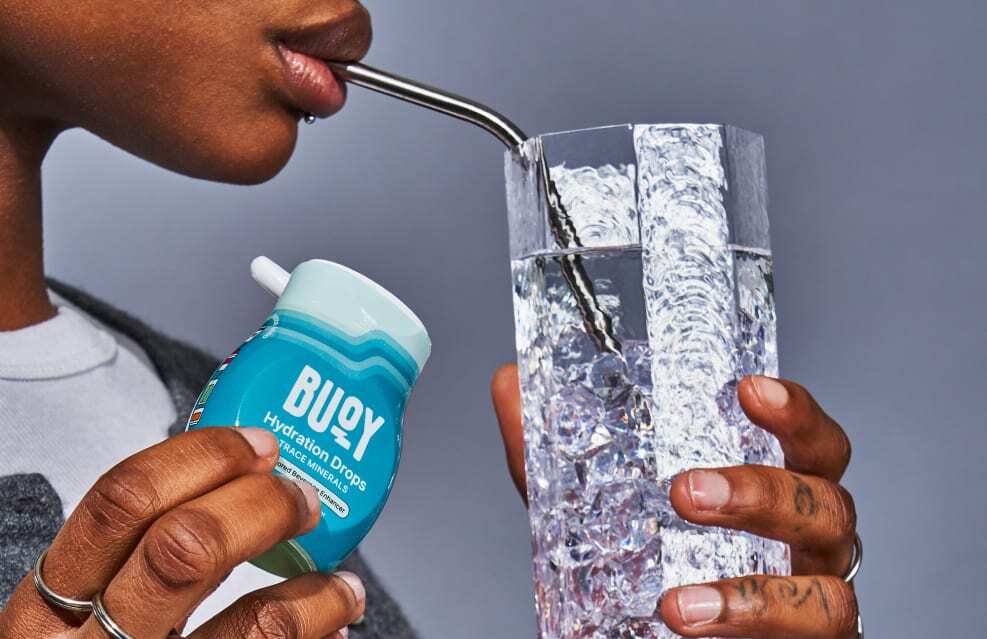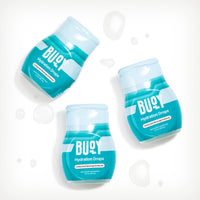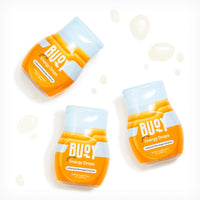We often think of dehydration as just a thirst problem. Grab a glass of water, and you're good, right? But there's more to it. Dehydration has wider implications for our health, and yes, it can even influence our body temperature, sometimes in ways that feel like a fever.
While it's rare for dehydration alone to cause a fever, not having enough fluids can make our body more vulnerable to conditions that do. It's a larger issue than many realize, with an estimated 75% of Americans not drinking their recommended daily water intake, impacting overall health and wellness (1).
Essential Takeaways:
- Beyond the common symptoms like thirst and fatigue, dehydration can lead to increased body temperature, mimicking fever symptoms. This elevation can be misleading and potentially harmful if not addressed.
- Combat dehydration's sneaky symptoms with Hydration Drops. Infused with 87 trace minerals and electrolytes, they ensure rapid and effective hydration. A light squeeze into your drink can make all the difference, helping you stay hydrated, healthy, and fever-free.
Curious about how this all connects? Let's dive deeper.
- What is Dehydration?
- Signs and Symptoms of Dehydration
- The Implications of Chronic Dehydration
- How Does Dehydration Cause Fever?
- Precautionary Measures to Avoid Dehydration-Related Fever
- Introducing Buoy Hydration Drops
- How Buoy Helps in Preventing Dehydration
- Healthy Habits for Adequate Hydration
- Wrapping Up
What is Dehydration?
At its core, dehydration occurs when your body loses more fluids than it takes in, resulting in a deficiency that can affect normal bodily functions. Common causes of dehydration include excessive sweating, reduced water intake, illnesses causing diarrhea or vomiting, and increased urine output due to conditions like diabetes (2).
Signs and Symptoms of Dehydration
Dehydration isn't always immediately obvious. While some symptoms are well-known, others might surprise you. Here are some key indicators to watch out for:
- Increased Thirst: The most common sign. Your body is telling you it needs water.
- Dark Yellow Urine: A clear indication that you're not drinking enough. Light yellow or pale straw is the ideal color.
- Reduced Urination: If you're not going to the bathroom as frequently, it might be a sign.
- Dry Skin and Lips: Dehydration can reduce the moisture available for your skin, leading to dryness.
- Fatigue: Feeling unusually tired or lethargic? Lack of fluids might be the culprit.
- Dizziness or Light-headedness: Dehydration can impact blood volume and pressure, leading to these symptoms.
- Headaches: A lack of proper hydration can lead to tension headaches or migraines, making it difficult to focus or go about daily tasks. If headaches are a recurring issue for you, check out our article Say Goodbye to Dehydration Headaches with Electrolyte-Based Hydration Drops to learn how to find relief.
- Rapid Heartbeat and Rapid Breathing: The heart and lungs might need to work harder due to decreased blood volume.
- Elevated Body Temperature: While it's rare for dehydration alone to directly cause a fever, an increased body temperature can sometimes mimic fever-like symptoms (2).
Understanding these symptoms is crucial. Dehydration can sometimes be mistaken for other conditions, or even exacerbate existing ones. Keeping an eye out for these indicators and acting promptly can prevent more serious health issues down the road.
The Implications of Chronic Dehydration
While the occasional bout of dehydration can be remedied with prompt fluid intake, consistently ignoring the body's hydration needs can lead to chronic dehydration. This prolonged state poses more severe risks than many realize:
- Kidney Function: The kidneys play a pivotal role in filtering waste products and balancing the body's fluids. Chronic dehydration can strain the kidneys, potentially leading to kidney stones and, in severe cases, kidney failure.
- Urinary Tract Infections (UTIs): A reduced urine output means the body has fewer opportunities to flush out bacteria. This can increase the risk of UTIs, which can be painful and require medical treatment.
- Recurring Fevers: As the body becomes more susceptible to infections due to weakened overall function, there's an increased chance of recurring fevers (1).
- Cognitive Impacts: Dehydration can affect brain function, leading to issues like reduced concentration, irritability, and mood swings (3,4).
- Digestive Problems: The digestive system relies on adequate hydration. Chronic dehydration can lead to constipation and an increased risk of acid reflux.
- Skin Health Issues: Prolonged dehydration can result in dry skin, which is more prone to wrinkling and other skin disorders (5).
For a deeper understanding of the extensive effects and signs of chronic dehydration, consider checking out our comprehensive guide Chronic Dehydration Symptoms Explained.
Recognizing and addressing dehydration early is crucial. The longer the body remains in a dehydrated state, the more severe the potential consequences. Prioritizing hydration is not just about quenching thirst; it's about safeguarding long-term health.
How Does Dehydration Cause Fever?
Dehydration's impact on our body's temperature regulation might surprise you. It's not just about feeling thirsty or tired—dehydration can interfere with our body's natural cooling system, leading to unexpected temperature changes (2). Let's explore how this happens.
The Role of Sweating in Cooling
The human body's primary cooling mechanism is through sweat. When we're well-hydrated, this system functions seamlessly, releasing excess heat to keep us comfortable. But dehydration disrupts this balance. With a reduced fluid level, our ability to sweat and cool down diminishes (2).
The Body's Temperature Response to Dehydration
As a result, our internal temperature can begin to climb. This elevated temperature can be mistaken for fever symptoms, even though it's not caused by an infection or illness. Instead, it's the body's way of sounding an alarm, signaling that it urgently needs more fluids to operate correctly (2).
Precautionary Measures to Avoid Dehydration-Related Fever
Dehydration's effects can be subtle yet impactful, leading to potential temperature changes that resemble fever symptoms. The good news? With a few proactive steps, you can reduce your risk of facing dehydration-related temperature spikes. Here are some key precautions to integrate into your daily routine:
Regularly Drink Water
It's easy to forget about hydration when caught up in the day's activities. However, even if you don't feel thirsty, make it a habit to sip water throughout the day. Setting regular reminders or carrying a reusable water bottle can be helpful strategies (6).
Monitor Urine Color
Your urine offers a direct window into your hydration levels. A pale straw color is a green light, indicating you're well-hydrated. On the other hand, darker hues are a caution sign, signaling that your body needs more water (2).
Stay Cool
High temperatures can accelerate fluid loss through sweating. Especially in hot environments, it's vital to take proactive breaks, opt for breathable clothing, and seek shade or shelter from direct sunlight when possible (1).
Beyond these specific strategies, it's essential to stay attuned to your body's signals. Recognizing the early signs of dehydration and acting promptly can make all the difference. Whether you're out on a summer hike or just navigating a busy workday, remember that maintaining proper hydration is key not only for temperature regulation but for overall health and well-being.
Introducing Buoy Hydration Drops
Looking for the best way to stay hydrated? Meet Buoy Hydration Drops, your newest ally in achieving optimal hydration. Crafted with precision, each drop combines the power of 87 ionic trace minerals and essential vitamins. The result? A perfect blend designed to supercharge your drinks, turning them into hydration champions.
Pure Hydration in Every Squeeze
With Buoy, you aren’t just adding to your drink—you're elevating it. And the best part? It's all about pure, uncompromised hydration: no sugars, no sweeteners, no artificial flavors. Just add a squeeze, and let your drink do the rest.
How Buoy Helps in Preventing Dehydration
At the heart of Buoy's efficacy is its bioavailable formulation. But what does that mean for you? It ensures that every drop you add is not only absorbed but utilized efficiently by your body. No wasted potential—just pure, efficient hydration.
The Perfect Addition to Any Drink
Whether it's your morning juice, midday water, or evening tea, a squeeze of Buoy ensures rapid hydration and remineralization, acting as a shield against dehydration.
Discover More
Ready to optimize your hydration? Explore Buoy's range of products here.
Healthy Habits for Adequate Hydration
Staying hydrated is more than just drinking water; it's about adopting a holistic approach to your daily routine. By incorporating specific habits, you can ensure your body gets the hydration it needs to function optimally.
- Incorporate Water-Rich Foods: Consider adding more fruits and vegetables to your diet. Choices like watermelon, strawberries, and cucumber are not only delicious but are packed with water, helping supplement your daily intake (7).
- Limit Caffeine and Alcohol: While a morning coffee or an evening drink might be enjoyable, it's essential to consume them in moderation. Both caffeine and alcohol can act as diuretics, increasing urine production and potentially leading to dehydration.
- Use Buoy Drops: There are times when you need a hydration boost, especially on the go. Buoy drops offer a convenient and effective solution, ensuring you remain hydrated no matter where you are.
Remember, hydration plays a crucial role in numerous bodily functions, from aiding digestion to keeping your skin radiant. By integrating these habits into your daily routine, you'll not only feel better but also promote long-term health and well-being.
Wrapping Up
Ensuring you're adequately hydrated is an important aspect of maintaining your overall health and well-being. By tuning into your body's signals and taking timely action, you can fend off the sneaky symptoms of dehydration and the associated health challenges.
Buoy offers an effective way to enhance this mindfulness around hydration. Isn't it time you gave your body the best? Elevate your daily hydration ritual. Take the Buoy challenge and try it risk-free for 30 days.
References:
- Taylor, K., Jones, E. B. (Updated 2022, October 3). Adult Dehydration. In: StatPearls (Internet). Treasure Island (FL): StatPearls Publishing. Retrieved from https://www.ncbi.nlm.nih.gov/books/NBK555956/
- Mayo Clinic. (2021). Dehydration. Retrieved July 18, 2023, from https://www.mayoclinic.org/diseases-conditions/dehydration/symptoms-causes/syc-20354086
- UConn Today. (2012). Even Mild Dehydration Can Alter Mood. Retrieved from https://today.uconn.edu/2012/02/even-mild-dehydration-can-alter-mood/
- Riebl, S. K., & Davy, B. M. (2013). The Hydration Equation: Update on Water Balance and Cognitive Performance. ACSM's Health & Fitness Journal, 17(6), 21–28. Retrieved from https://doi.org/10.1249/FIT.0b013e3182a9570f
- Palma, L., Marques, L. T., Bujan, J., & Rodrigues, L. M. (2015). Dietary Water Affects Human Skin Hydration and Biomechanics. Clinical, Cosmetic and Investigational Dermatology, 8, 413–421. Retrieved from https://doi.org/10.2147/CCID.S86822
- Popkin, B. M., D'Anci, K. E., & Rosenberg, I. H. (2010). Water, Hydration, and Health. Nutrition Reviews, 68(8), 439–458. Retrieved from https://www.ncbi.nlm.nih.gov/pmc/articles/PMC2908954/
- Healthline. (2017). 19 Water-Rich Foods That Help You Stay Hydrated. Retrieved from https://www.healthline.com/nutrition/19-hydrating-foods
















